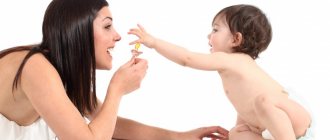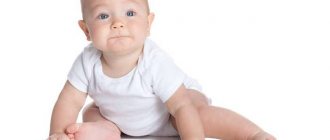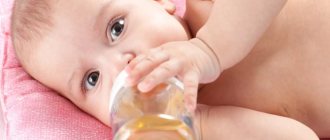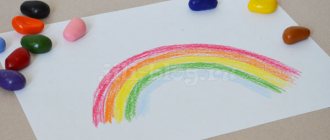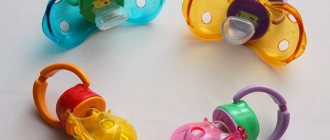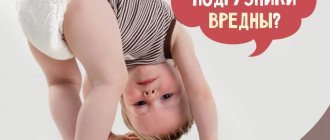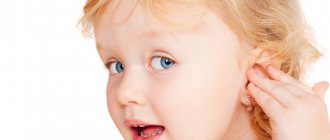Parents should not worry too much about how to wean their baby off the pacifier, since there are no known cases where a child would go to school with a pacifier. Every child still refuses it sooner or later.
But still, how to do it correctly and avoid making major mistakes. How to prevent shame from others who find this activity too childish. And if parents are not yet thinking about weaning, then grandparents will definitely remind you of this and say, “Petenka from the next door is much younger, but no longer uses a pacifier.”
Does a baby need a pacifier?
Of course, the simplest thing a mother can do is not to introduce a pacifier from the very beginning. Then you won’t have to wean yourself. Unfortunately, only a small number of parents decide to abandon breast substitutes altogether. Many people wonder whether it is possible to give a pacifier to a child, worrying whether the bite will deteriorate, whether the baby will be late to speak, etc. But the need to perform other household chores or simply relax with a cup of tea inclines most women to use a pacifier. Its use is based on the baby's sucking reflex, which fully satisfies the baby's need for the calm and warmth of the mother. A bottle-fed baby also needs a pacifier to train the facial muscles involved in sucking the nipple of a bottle with formula. The sucking reflex weakens around the age of one. But the baby gets so used to his pacifier that he perceives any attempt to deprive him of this fun as screaming and yelling.
Useful tips
A boring pacifier and how to wean a child off it is a concern for many parents. Browsing maternal forums allows you to choose the most useful tips that will allow you to quickly cope with a bad habit.
- When the introduction of complementary foods begins, you can give your child a nibbler instead of a pacifier. This device is a mesh or silicone container with holes into which grated fruits or vegetables are placed. The baby will suck the nibbler, little by little forgetting about the pacifier.
- For an older child, buy a wind musical instrument: a harmonica, pipe or whistle. The only negative is that not many parents are able to withstand such a unique musical accompaniment.
- Try to load your child as much as possible: physically and emotionally. Walk outside longer, play actively at home, then give your baby a bath with lavender oil (if there are no allergies) and put him to bed. Tired, the baby won’t even remember the pacifier.
- Teach children to drink from a mug and feed from a spoon. This will help you gradually wean yourself not only from the pacifier, but also from the bottle with the formula. After all, the habit of these two devices develops in parallel.
- Another tip is to wean off the pacifier in play activities. During the process of weaning, play more, give various balls, chewers, teethers. There is no need to remind or give a pacifier, even if the baby starts crying. A return is possible if he persistently asks for it.
- How to wean a child from sleeping with a pacifier? Create a new calming ritual for your child before falling asleep, which does not include a pacifier. This could be a new song, reading a book, swinging on arms, bathing with beautiful toys.
Be sure to read the psychologist’s useful recommendations on how to teach your child to drink from a mug.
Another useful and informative article about how to wean a child from the breast. A pediatrician will describe psychological and medical methods for weaning your baby.
In the process of weaning off the pacifier, take into account not the opinions of neighbors or grandmothers at the entrance, but the individual characteristics of your child. Only in this case will you be able to choose the most harmless way to get rid of such an annoying silicone device.
Pros and cons of using a pacifier
The baby begins to suck his finger while still in his mother’s belly. In the first months and years of a child's life, the sucking reflex is very strong. For children up to one year old who do not suckle at their mother's breast, pacifiers satisfy their sucking instinct. If there is no pacifier, no breast, then there is a chance that the child will start sucking his thumb, and this habit is much more serious than the habit of using a pacifier. Therefore, the question of whether it was worth accustoming a child to a pacifier or not is completely ambiguous and has its pros and cons.
Benefits of pacifiers and which babies need them
- Cranky and restless babies need a pacifier to calm them down.
- The child falls asleep faster; he does not need to lie at his mother’s breast for an entire hour.
- The pacifier distracts the baby during unpleasant procedures, for example, vaccinations, changing clothes.
- It is much easier to wean a child from sucking a pacifier than from sucking his own finger, because the pacifier can be removed, hidden, cut up and thrown away.
- When teething, the child uses a pacifier to massage his gums and reduce discomfort.
Negative aspects of a pacifier
Although it has already been scientifically proven that the pacifier does not cause crooked teeth and does not change the bite, there are certain negative aspects of this habit:
- A child who does not want to give up a pacifier begins to talk later than other peers. A pacifier in a baby’s mouth prevents him from repeating the sounds and words that adults pronounce. Lack of development of speech and communication skills leads to later development of thinking.
- Sometimes sucking helps the baby compensate for the lack of parental love and attention, and after separation from the pacifier the child feels lonely.
Pros and cons of pacifiers
Flaws
Of course, the pacifier has a number of disadvantages, otherwise there would not be so much controversy about its harms and benefits.
The disadvantages of using are:
- Possible interference with breastfeeding. It happens that the baby refuses the breast in favor of the pacifier. This means that he gains weight worse and develops more slowly.
- Abuse. Sometimes a child's crying is caused by a specific reason, for example, a rolled-up corner of a diaper rubbing the skin. It is easier for a parent to give a pacifier than to figure out why the child is crying.
- Formation of malocclusion. This happens when sucking a pacifier for more than 2 years on average, as well as when using non-orthodontic pacifiers.
- Difficult weaning. For most children, it then goes away with hysterics, as a strong habit is developed.
- The likelihood of poisoning and helminthiasis is higher. The pacifier is in the mouth not all the time the child is awake. The more he moves, the more often the pacifier falls on the floor and dust settles on it. All this ends up in the child's mouth.
- Entry of pacifier material into the stomach and respiratory tract. When a baby grows teeth, he begins to gnaw on everything. At the same time, he can bite off a piece and swallow it. There are chances that the child will either swallow it or choke on it.
Attention! There is no clear rule about whether you can give a pacifier to a newborn. Each mother weighs all the pros and cons and makes her own choice.
Is it time to wean off the pacifier?
Many parents are interested in the question of when to wean their child off a pacifier? Until the age of one, you don't have to worry about your baby keeping the pacifier in his mouth because it's natural. However, when you see, for example, a three-year-old girl with a pacifier, while wearing high-heeled shoes, the first thing that comes to mind is that parents do not care about the health of their child.
No one will give an exact answer; everything depends individually on the development and behavior of each individual child. You can try raising babies with a pacifier at the age of eight to nine months. It is at this time that the baby develops a chewing reflex and the need for sucking decreases.
Of course, it’s okay if the baby continues to suck a pacifier even until he’s two or three years old, but it’s advisable to wean him off as early as possible. Over time, sucking a pacifier becomes for a child no longer a means of satisfying the sucking reflex, but a habit, the same as for cigarette smokers. There is no special remedy or drug that will make the child forget about sucking the pacifier; parents need to do a whole range of measures in order to pick it up without much stress for the child.
How to choose a pacifier?
When buying necessary things for their baby, mothers often ask themselves the question: which pacifier to choose for a newborn when breastfeeding? First of all, you need to take into account that long-term use of a breast substitute can worsen the bite.
We recommend reading: Night terrors in children: how do they manifest themselves, reasons, how to overcome?
It is quite difficult to choose the right pacifier, because there are quite a lot of them on store shelves, they vary in price, shape and color. Children prefer latex ones, as they are quite soft. But such types last very little, so very soon the pacifier will have to be replaced.
Silicone nipples are considered more durable. But they are again harsher and are not suitable for newborn children.
If the pacifier is damaged (the baby has bitten it), then throw it away; there is no need to give it to the child again, it can damage the palate or gums.
When a mother thinks in advance about her child’s health and proper bite, she buys an orthodontic pacifier. Many companies produce such items. But a child cannot always take such a pacifier.
Proven ways to wean your baby off the pacifier
Naturally, the baby will resist with all his might, forcing his parents to return his favorite pacifier. Children do not like it when their usual order of things suddenly changes. But parents should be patient and firm so that your intentions of weaning your beloved child from the pacifier are crowned with success.
So
:
Tip #1
The main thing is on time! It is important to choose the right moment, to feel your child’s readiness to wean from the pacifier. The optimal age when it is quite possible to wean a child off a pacifier is six to nine months and a year and a half. Some babies require the presence of this infant attribute until they are two years old. There is nothing wrong with the fact that a child sucks a pacifier for so long, but measures need to be taken.
Tip #2
Individual approach! Be sure to take into account the age characteristics of the child. So, for example, if you are weaning a baby in infancy, then try to teach him to drink from a mug or a special sippy cup. This will minimize contact with the nipples. Also, try not to give a pacifier unless your child insists. Therefore, it is better not to keep it in a visible place. You can explain to babies 1-2 years old why they should not use a pacifier. Have a “serious” conversation about how the little one is already big and doesn’t need his favorite pacifier, that they will laugh at him in the sandbox, etc.
Tip #3
Be creative! When thinking about how to wean your baby from sucking a pacifier, do not forget to use different methods. Tell a story according to which a cat stole a pacifier or was carried away by birds, or that a very little girl from a neighboring apartment needs a pacifier. Let your little one help you pack this accessory beautifully and give it to the new parents. Some mothers offer an interesting way to wean off the pacifier: you need to carefully cut the tip of the pacifier by 1-2 mm with scissors and give it to the child. The pacifier loses its charms, and many babies quietly stop using it.
Tip #4
Difficulties are in a dream! The hardest thing is to wean a child who is accustomed to having the pacifier constantly in the mouth during sleep. In this case, the mother will need a lot of patience and the ability to control herself - the child will probably cry loudly and fall asleep for a long time, and once asleep, wake up often. Parents should calm the baby down, sing him lullabies, etc. If your child throws a tantrum, you need to back off and return the pacifier.
Tip #5
Rule of five no's. When weaning your toddler off the pacifier, to avoid causing mental trauma, follow the five “don’ts”
:
- Don't yell at the little one.
- Don't take it out on him because of his failures.
- Don't deceive the little one.
- Don't tease your baby or offend him.
- Do not scare the baby under any circumstances.
Safety regulations
Is it necessary to supplement the baby with water while breastfeeding?
It is important to choose the right baby pacifier and care for it:
- Be sure to sterilize. This is done in the same way as with bottles: in the microwave using a special device or a special bag, or at least with boiling water. An item that has fallen on the floor should not be given to a child.
- It is better to give preference to silicone. It's harder to bite through. It is also more resistant to high temperatures during sterilization.
- Use protective cases. When you need to take the pacifier with you on the road, for example, carry it in a special (also sterilized) box.
- Use leashes. This is a kind of tape with a clip. One edge of it is attached to the pacifier arm, and the clip is attached to the baby’s clothing. It prevents objects from falling on the floor, protecting them from contamination. In this case, the tape should not be long so that the child cannot wrap it around his neck.
- Replace pacifiers on time. Latex “lives” for no more than a month, silicone - three. Allergies may occur to these materials. If you suspect it, you should immediately stop using the pacifier, give the child an antihistamine and consult a doctor.
- After a year or a year and a half, try to wean off. More precisely, you need to look at the child’s readiness. Parents should be prepared for the fact that about three days will be difficult. Afterwards it will become easier. By this moment, there must be at least one more calming mechanism in order to replace the usual sucking.
We recommend reading: Review of the book “Secrets of a Sleepy Mom.”
Unlearning process
When should you not take your baby's pacifier away?
When weaning is not recommended:
- During the period of teething.
- At the time of illness.
- There is a stressful situation in the family.
- You are not at home with your baby (trips, travel, moving).
- You leave the baby with another person (registration in a nursery, nanny).
How exactly to wean a child off a pacifier depends abruptly or gradually on the character of the parents and the baby himself; in this case, there is no fail-safe recipe, there are only general tips that you can use or simply take into account.
“Who should I give a pacifier to?” - an effective weaning method
Most young parents believe that the best way to force their child to give up a pacifier is to ask him to give it to someone, for example, a sister or brother, if he has one. If the child is alone in the family and there are no kids around who are so close to him, then you can give a pacifier to a cat, a squirrel in the park, a crow with its chicks, and so on, you can think of anything. Until the baby himself decides to give up the pacifier, no measures taken by the parents will have any result, at least without hysterics.
Using this method, it is worth remembering that if the baby does not want to give a pacifier, in no case should you take it away, put moral pressure on it, or say that he is greedy. We must try to do everything so that the donation process does not turn into a drama for the child. If the baby categorically does not want to part with the pacifier, this indicates that the time has not yet come when you need to try to wean him, and you just need to wait.
Which is less harmful: a pacifier or a finger?
Doctors are unanimous on this issue: it is better to let the child suck a pacifier than his own finger. This is especially true for the period when baby teeth have not yet appeared. There are several reasons for this:
- The habit of thumb sucking is much stronger, because it is always there, you don’t have to ask or look for it like a pacifier.
- An infant who has a particularly strong need to satisfy the sucking reflex may seriously deform his finger.
- A pacifier made of high-quality materials and suitable for the baby’s age has much less negative impact on the jaws.
- The pacifier is easier to keep clean, it is disinfected, and you can be sure that the infection will not get into the child’s oral cavity in this way.
It is better to wean your baby off the habit of thumb sucking as early as possible, distracting him in every possible way with a pacifier or special latex teething toys.
What not to do
In order for the process of weaning a child from a pacifier to give a positive result, you should not allow the following actions:
- You should never scold your baby because he is old enough and still sucks a pacifier. He is unlikely to understand why you are yelling at him, but he may get scared. As we know, children copy adults and their behavior, and if you constantly throw a tantrum over a pacifier, the child will most likely do the same. If you approach the weaning process with kindness, calmness and patience, then the baby will be less worried about parting with her.
- Some mothers, in order to wean their child off the pacifier, smear it with various tasteless compounds such as mustard, chloramphenicol ointment, however, this is absolutely not worth doing. Firstly, by doing so you cause the baby offense and anxiety, and secondly, you develop fear in him, because, as you know, it is in the first year and a half that children learn about the world around them through their mouths, that is, they need to taste everything. Thus, when a child puts a familiar pacifier into his mouth and unexpectedly realizes that it is bitter, he develops a fear of other things that were familiar to him from the cradle.
- You cannot intimidate the baby with the idea that if he does not stop sucking the pacifier, something terrible will happen to him, for example, a wolf will come and take him into the forest. With these methods you expose the child to additional stress.
- There is no need to compare your child with children and shame him that others already go without a pacifier, but he is like a little one. Regardless of what methods you use to wean your child off the pacifier, the main thing to remember is that you are a source of positive emotions for your baby and nothing else, he should feel supported by you.
- There is no need to change your chosen tactics. Even if something doesn’t work out and the baby still throws tantrums because the pacifier disappears, you need to try to control yourself and not get angry. You should never give a child a pacifier back under the influence of his screams, because he will immediately understand that with screams and hysterics he can achieve everything he needs.
What if you don't give your baby a pacifier?
If you don’t want to give your baby a pacifier, then breastfeeding will help.
A situation may arise when, immediately after feeding, the baby again demands to be fed. It is worth giving your baby the breast, as children often fall asleep during the process of simple quiet sucking.
If the baby starts crying on the street, and it is during this period that the mother does not have the opportunity to breastfeed the baby, it is worth heading home.
There is an opinion that up to two months a child can stay at home most of the time; he does not yet need daily walks. Over this age, the street and fresh air, on the contrary, will help the baby sleep better even without a pacifier.
You can also avoid using pacifiers after taking a bath. If the baby needs to be lubricated, rubbed or dressed, and he cries, then you should first breastfeed the baby, wrapping him in a soft towel. Then carry out all hygiene procedures and dress the baby.
Newborn babies are often capricious when changing clothes. The woman will dress the baby faster each time, so as not to once again provoke the baby’s tears. You can also dress your baby while standing, with the help of loved ones. After all, such behavior of a child usually manifests itself when changing clothes while lying down.
Some mothers do not want to breastfeed their children in public places because of embarrassment and give the baby a pacifier. But it is much better to use special nursing underwear and give the baby the breast upon request.
In cases where a child’s crying is caused by anxiety or fear, it is enough to hug him, feel sorry for him and calm him down. If warm hugs and mother's care do not help, then you can breastfeed.
Sometimes children develop the habit of thumb sucking. The baby is more accustomed to this; this is his behavior even in the womb. If you limit a child in this, he will not understand why parents prevent him from doing what he is used to. As a rule, by the age of one year this behavior goes away on its own. Or the habit will go away as soon as the baby has all its teeth. If his hand stays in his mouth for a very long time, perhaps the child is already hungry and it’s time to feed him.
Important tips for parents
There are also several recommendations that will help you make the process of weaning your child off a pacifier as painless as possible:
- If you notice that your baby is sucking a pacifier, do not shame him in any way, and certainly do not scold him. Swearing has never been effective in parenting, especially with young children. But praise can be your good assistant in weaning off the pacifier. Children really appreciate their parents' praise and approval.
- Under no circumstances should weaning a baby from a pacifier occur at the same time as other significant events for him - going to kindergarten, moving, mother going to work, etc. The most important thing that is simply necessary for a child’s peace of mind and his harmonious development is stability. Therefore, you should not place a double burden on the baby’s psyche.
- Never try to wean your baby off the pacifier while he is sick. This will not only have a traumatic effect on the baby’s psyche, but can also actually worsen his health.
- Do not delegate weaning your child from the pacifier to relatives - dad or grandmother. The baby needs his mother’s support during this difficult period of his life.
- If you have decided to wean your child off a pacifier, do not go backwards. Your actions should be consistent, gentle, but nevertheless persistent. You should not make the slightest concession not only to the child, but also to yourself. After all, it is precisely because of the relaxation of herself during sleepless nights and children's hysterics that the mother cannot stand it and again gives the baby a bottle. But the more strictly you follow the rules you set, the easier and faster the child’s weaning from the pacifier will be.
- When weaning off a pacifier, remember that most often children require a pacifier if they are upset about something, are very tired, or are bored. Try to prevent such situations from occurring. And if you still cannot avoid it, do not leave the baby alone with your mental discomfort - calm the baby down, distract him from your emotional experiences.
- Very often a baby starts asking for a pacifier simply because he is bored. Therefore, when deciding how to wean your child off the pacifier, try to ensure that the child’s free time is constantly occupied with something: games, drawing, reading together. Try to spend more time with your child and go for walks. If the child still very insistently demands a pacifier, try to find an alternative replacement - an apple, juice or milk through a straw.
Wrong actions and methods
Along with the questions of what time to start getting rid of a bad habit and how to wean a child off a pacifier correctly, you need to remember about undesirable actions that can only delay the process and harm the child’s psyche. What should you abstain from?
- do not wean your child off the pacifier when he is sick, not in the best mood, or adapting to kindergarten. During such periods, the baby already feels unwell, and adding several stresses will only aggravate the problem;
- do not force your baby to give a pacifier. If your child is an owner (and this is almost always the case), then forcing him to give his item to another child is extremely undesirable. If your baby is greedy, find another way to wean him off;
- Do not smear the pacifier with bitter substances. Mustard, hot pepper, lemon and aloe juices not only give a lot of unpleasant emotions, but can also lead to allergies. In addition, having forgotten about the bitter taste, the baby may demand to return the pacifier;
- don't scold the baby. You can’t say that he’s a crybaby, a crybaby, etc. A 2-3 year old child is already a bright personality, so there is no need to lower the child’s self-esteem with such unpleasant words and name-calling;
- Do not damage the pacifier. Some mothers cut off the tip of the pacifier to make it uncomfortable for the baby to suck on it. But a cut pacifier can lead to suffocation if the baby bites off a piece of silicone and chokes;
- Don't offer gifts. An older child will quickly realize that for refusing a pacifier you can get something valuable, and will begin to demand toys and sweets. You can encourage the child later, when he definitely refuses the pacifier;
- do not wean during teething. This process is painful. And the pacifier reduces the severity of pain. At the same time, you can and should give your child a special cooling teether.
If you decide to rid your child of the habit, stand your ground and do not return the pacifier after the first tears. If the baby’s condition worsens, you can buy a new pacifier without bringing the situation to a nervous breakdown.
How to wean your baby off a bottle nipple
After you wean your baby off the pacifier, there will come a time when weaning your baby off the bottle will also become imperative. The mother must also decide for herself when to wean the child off the bottle - she will definitely notice that the baby is ready for this. There is no clear opinion among pediatricians about when and how to wean a child off the bottle. Some children are able to do without a bottle at 10 months, while others cannot go without a bottle at two years.
However, from about 10 months you can introduce your baby to a sippy cup. By the way, a sippy cup is the easiest way to wean a child off a bottle. Buy a bright and colorful sippy cup that can attract your baby's attention. As a rule, at this age all children are drawn to everything new and unknown. And they will happily drink from the sippy cup.
After some time, the lid of the sippy cup can be removed, turning it into a cup. Children very quickly get used to drinking from a cup and willingly part with the bottle. If your baby is stubborn, you can use a little trick - dilute the milk in the bottle with water, and leave it whole in the cup. The baby will very soon notice the difference and will prefer to drink from a cup.
Is a pacifier dangerous?
Many parents worry that prolonged use of a pacifier will harm the development and health of the baby. In fact, it has been scientifically proven that the pacifier has no effect on the mental development of the child. The true, deeper reason for parents’ worries is dependence on other people’s opinions, the influence of society.
The country's chief pediatrician, E. O. Komarovsky, also speaks about this: “As a rule, parents urgently begin to wean their child off the pacifier not at all because they themselves decided so. But because someone shamed them - they say, your child is already such a big one, and everyone walks around with a pacifier.”
Think about what you are really worried about. If it’s about you, your fear of public condemnation, and not about concern for the health and development of the child, then you need help, not the baby. Leave the baby a pacifier and get to work on yourself. If this is not your case, then start weaning your baby off the pacifier.
Opinion of a psychologist, dentist and speech therapist
Speech therapists’ opinions on pacifiers
According to speech therapists, early refusal of a child to breastfeed and transfer to spoon feeding does not allow the facial muscles and tongue muscles that are involved in the speech process to develop properly. Thus, by not giving a pacifier, parents deprive him of the opportunity to satisfy his natural instinct - the sucking reflex, which further affects his ability to articulate and pronounce certain syllables, especially those that involve the tip of the tongue.
At the same time, prolonged use of a pacifier leads to the fact that the baby begins to try to speak through the pacifier, which leads to incorrect formation of his speech.
A pacifier in the eyes of a psychologist
Psychologists do not have a clear opinion about pacifiers, which is not surprising. Some confidently declare that it prevents children from exploring the world by tasting it, while others declare the need for a pacifier for those children who do not receive proper attention and love due to the constant employment of their parents. And indeed, sucking a pacifier is the only way for a baby to distract himself from grievances and turn his attention to this process.
The opinion of dentists on this matter
Up to about six months, babies retain a sucking reflex, which can be satisfied by breastfeeding, bottle feeding, and also by sucking a pacifier. If the parents categorically do not give the baby a pacifier, experiencing a deficiency of sucking activity, he may pull various available objects into his mouth, including a finger.
At the same time, the load when sucking a finger is not distributed evenly on the jaw, as is the case with a pacifier, the bite is disturbed, and weaning a child from thumb sucking is not as simple as weaning it from the pacifier, since in extreme cases it can simply be hidden, which with a finger you can't do it. At the same time, prolonged and constant sucking of the pacifier can also lead to malocclusion.
When to wean off the pacifier
Weaning off a pacifier, like addiction, varies from person to person. Some babies do not want to put the pacifier in their mouth, while others gladly accept this replacement and do not want to give it back later. For some children, this is emergency help at a time of excitement or hysteria. But for others it is an integral part of life. These and other factors influence the process of weaning off the pacifier.
Psychologists and pediatricians agree that the age of weaning does not matter. But you definitely can’t do this until you’re a year old. This is due to the developmental psychology of children: they retain the sucking reflex until they are one year old. It is so pronounced that without a pacifier the baby will suck a finger, toys, mother's breast or something else. The pacifier is a safe option for satisfying the instinct. In addition, with a pacifier, the child sleeps more soundly and is less capricious. She gives him a feeling of security and calms him down.
Unlike sucking on a pacifier, sucking on other objects or body parts is dangerous for a child's bite and subsequent socialization. Sucking on other objects is considered a bad habit that can persist for many years. You definitely need to get rid of this.
How to wean a child off a pacifier: advice from women on the forum
And bath
My son was 1 year and 10 months old when I decided to wean him off. He fell asleep only with her, at night he might not look, or he might look. During the day I took it when I was upset about something. I was worried that the youngest (at that time 2 months old) was actively sucking the pacifier and thought that this would make the older one even longer weaned. But no, one morning we “lost” her; the mouse carried her away to her little mice. On the first day there were tears, but not a lot (when going to bed at night) - I calmly said that when the mice had enough of playing, they would give it back. On the second day I remembered a couple of times, I said that the mice had her, I whined and that was it. From the third day I practically didn’t remember.
Oksana
We were 2.1 and I decided it was time to wean off. I sucked endlessly both at home and at night. A friend advised me to cut the pacifier into 4 parts. She became all ugly. They take it to suck, it doesn’t work and throws it away. So 2-3 days and we weaned ourselves off. But I slept restlessly at night for about a week. She had a lot of stress during the day.
H3:
Kate
The son did not want to part with the pacifier: he slept only with it, and during the day he also periodically looked for it. The pacifier was already all chewed up into junk, but no, there was no way without it. I bought a new one (although I didn’t want to, it was already 2.5 years old). I threw out the old one, gave him a new one, he pushed his horn - where is my red pacifier?! I say: she's broken. He cried, but refused to suck the new, green one, so he fell asleep. The next morning he already agreed to the green one, but I offered him either a pacifier or a new machine - he chose the machine. Then for another week I remembered where the red pacifier was - it was broken. Where is the green one? We exchanged it for a car. Sobbing. Then I forgot. By the way, before this, for two months in kindergarten he fell asleep during the day without a pacifier, so I understood that he could do without it.
Svetlana
We somehow gradually switched to bedtime mode (to fall asleep, then take it away) and if I cried a lot (fell, hit myself) they gave it to me. If you didn’t pick it up at night, or slept restlessly, then in the morning the rule is: when you wake up, give me a pacifier. And on the shelf, higher up. I didn’t want to rape my son. He chewed it up and got dirty with it - that was fine with him. Even though I knew that you could buy a new one))). Then I fell asleep calmly without her, but it took longer. Now (at 3.3) I have a pacifier under my pillow. If you have a bad dream, then I give it to you to calm down quickly.
If you didn’t pick it up at night, or slept restlessly, then in the morning the rule is: when you wake up, give me a pacifier. And on the shelf, higher up. I didn’t want to rape my son. He chewed it up and got dirty with it - that was fine with him. Even though I knew that you could buy a new one))). Then I fell asleep calmly without her, but it took longer. Now (at 3.3) I have a pacifier under my pillow. If you have a bad dream, then I give it to you to calm down quickly.
Lena
Initially, we only had a pacifier for sleep; we were given it very rarely during the day while we were awake. I unlearned it myself in a few days - I got sick and my nose was clogged. I tried to suck the pacifier, but, of course, it didn’t work. we removed it and he didn’t remember it anymore.
Tonya
The son sucked the pacifier for a long time. almost up to 2.5 years. My husband has already eaten my brains out that it’s time to wean the child. but for some reason it didn’t bother me too much. yes, it seems like we need to wean him off, but I somehow felt sorry for my son. and then he got sick with rotavirus. he was constantly sick and vomiting. and with the pacifier the nausea intensified. and he himself understood this and allowed me to remove it. While he felt bad for 3 days, he didn’t remember her at all. As soon as I felt better, I started asking for a pacifier. I said that the pacifier became infected with a disease and I threw it away, otherwise he would get infected again from the pacifier and would vomit. He listened to my arguments. He very easily agreed that he didn’t need a contagious pacifier and we forgot about it. There was at least one benefit from this disease.
Lina
You need to wean off gradually, first limiting sucking as much as possible during the day, distracting the baby. And then you can arrange a ritual of giving a pacifier to a little lala, for example, she is crying, she needs it more. Or give it to a cat, dog, you can come up with many options. I wouldn’t put anything bitter or tasteless on the pacifier.
Elina
My experience in weaning children off pacifiers is not easy. The first daughter, at the age of 1 year, herself refused the nipple and threw everything away. On the second, we, as developed parents, decided to take away this item, which in our opinion was unnecessary, within six months. The baby began to suck his finger, and categorically refused the pacifier, which we decided to return. The thumb definitely tasted better. The struggle was unequal until she was 2 years old, special bitter varnishes from the pharmacy did not help, the daughter indulged in her favorite pastime with pleasure, despite the bitterness. The finger became thinner (really!), and the upper jaw began to protrude forward. I had to swaddle (wrap) my arms for a month, but it helped. Don’t repeat our mistake, just gradually reduce the baby’s contact with the pacifier, leaving it, for example, only while falling asleep. The baby will refuse on his own; no one sucks a pacifier until the age of 18.
Alina
A pacifier for a baby is a kind of comforter, a friend. Therefore, it is better not to resort to barbaric methods (such as mustard, pepper) of weaning off the pacifier. Otherwise, you can simply get psychological trauma. For our child, we immediately rejected this option. Ideally, the baby should stop sucking a pacifier by the age of three. Until then, it is better to wean him off gradually, increasing the intervals between sucking the pacifier, until the baby completely forgets about it. It is ideal to stop bottle feeding and giving the baby a pacifier at the same time. You can give the pacifier a “send-off”. Our son gave a pacifier to the dog and never thought about it again. The main thing at the time of weaning is to give the child as much attention as possible and in no case get angry if something doesn’t work out. Adults also do not always succeed in quitting smoking the first time.
Sources:
https://jlady.ru/interesno/kak-otuchit-rebenka-ot-pustyshki.html https://leaky.ru/kogda-otuchat-rebenka-ot-pustyshki/ https://www.my-sunshine.ru /kak-otuchit-rebenka-ot-soski https://ladyibaby.ru/razvitie-rebenka/kak-otuchit-rebenka-ot-pustyshki-i-chego-nelzya-delat.html
Why is it worth weaning your baby from sleeping with a pacifier?
For many parents, a pacifier in the first months of a newborn’s life becomes a real relief from baby’s crying. But if the baby gets very used to the pacifier, uses it constantly, and does not part with it day or night, then this can lead to problems in the development and health of the baby.
The most common side effects from long-term pacifier abuse are:
- Dental malocclusion. Teeth begin to grow crooked if a pacifier is used after the age of two.
- Risk of inflammation of the middle ear (otitis media).
- Slow development of the speech apparatus. The more the mouth is occupied by the pacifier, the less children will use language and sounds to communicate with others. After all, in order to start communicating, you first need to pull out the pacifier, and at a young age, children may not immediately think of this. Late development may further affect the pronunciation of individual sounds.
- Risk of contracting an infection. Nipples often fall off. While children are very small, mothers pick them up, wash them and return them to the baby. As they get older, they themselves learn to pick up a pacifier from the floor or the ground and put it straight into their mouth. At this point, an infection may occur.
Often parents begin to use the method of shortening the pacifier. He has an argument “against” because of its unsafety for the life and health of the baby. The integrity of the pacifier is compromised and during active sucking a piece of latex can enter the child’s respiratory tract with all the ensuing consequences.
